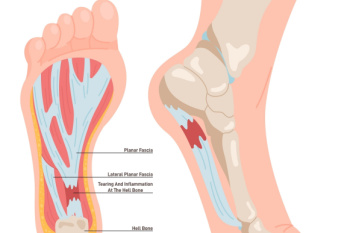
Plantar fasciitis can be a result of inflammation of the plantar fascia, which is the thick band of tissue connecting the heel to the toes. This condition typically occurs from repetitive strain or excessive pressure on the feet. It is commonly experienced by athletes, runners, and individuals who stand for extended periods. The hallmark symptom of plantar fasciitis is heel pain that is particularly sharp and stabbing, and often worsens with activity or after prolonged periods of rest. Additionally, individuals with plantar fasciitis may experience discomfort along the arch of the foot. While the severity of symptoms can vary, untreated plantar fasciitis can significantly impair mobility and quality of life. Early recognition and appropriate management, including rest, stretching exercises, orthotic devices, and in severe cases, surgical intervention, are important for effective relief and prevention of long-term complications. Plantar fasciitis is treated by a podiatrist. If you are experiencing any of the above symptoms, it is suggested that you contact this type of doctor who can successfully provide treatment.
Plantar fasciitis can be very painful and inconvenient. If you are experiencing heel pain or symptoms of plantar fasciitis, contact one of our podiatrists from Toms River Podiatrist . Our doctors can provide the care you need to keep you pain-free and on your feet.
What Is Plantar Fasciitis?
Plantar fasciitis is the inflammation of the thick band of tissue that runs along the bottom of your foot, known as the plantar fascia, and causes mild to severe heel pain.
What Causes Plantar Fasciitis?
- Excessive running
- Non-supportive shoes
- Overpronation
- Repeated stretching and tearing of the plantar fascia
How Can It Be Treated?
- Conservative measures – anti-inflammatories, ice packs, stretching exercises, physical therapy, orthotic devices
- Shockwave therapy – sound waves are sent to the affected area to facilitate healing and are usually used for chronic cases of plantar fasciitis
- Surgery – usually only used as a last resort when all else fails. The plantar fascia can be surgically detached from the heel
While very treatable, plantar fasciitis is definitely not something that should be ignored. Especially in severe cases, speaking to your doctor right away is highly recommended to avoid complications and severe heel pain. Your podiatrist can work with you to provide the appropriate treatment options tailored to your condition.
If you have any questions please feel free to contact our office located in Toms River, NJ . We offer the newest diagnostic and treatment technologies for all your foot and ankle needs.
